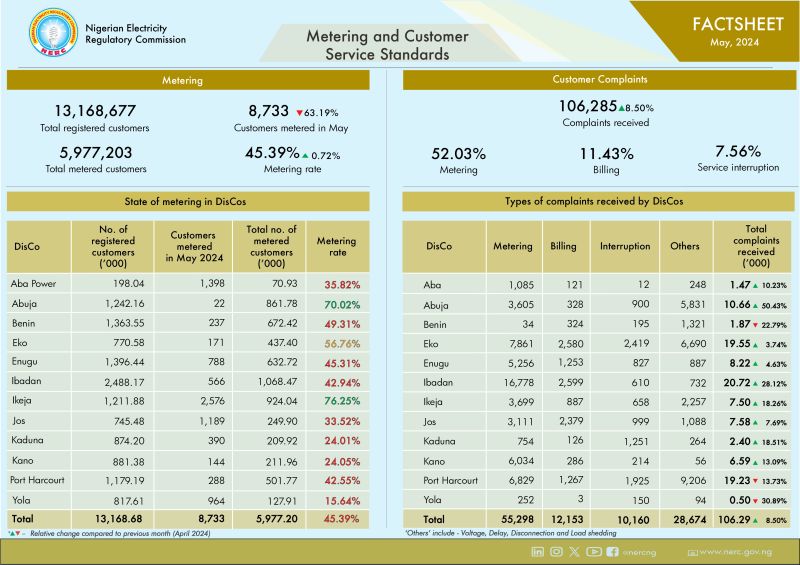- Ikeja Electric metered 2,576 customers in May 2024, while AEDC recorded the lowest number of metered customers, with only 22 customers.
The latest Metering and Customer Service Standards factsheet for May 2024, released by the Nigerian Electricity Regulatory Commission (NERC), shows that the number of metered customers in May 2024 dropped by 14,991, a 63.19 per cent decrease.
The total number of metered customers in May, 8,733, compared to 23,724 in April and 56,994 in March, indicates a steady decline in the number of metering customers.
However, the metering rate increased to 45.39 per cent, a 0.72 per cent increase compared to March and April (44.79 and 44.67 per cent, respectively). Only Ikeja and Abuja recorded 76.25 and 70.02 per cent, respectively.
As of May 2024, the total number of registered electricity customers stood at 13,168,677, while the total number of metered customers was 5,977,203.
On individual electricity distribution company (DisCos) performance, Ikeja Electricity Distribution Company (Ikeja Electric) ranked highest in the number of metered customers. Ikeja Electric metered 2,576 customers, a 76.25 per cent metering rate increase compared to April 2024. It was followed by Aba Power (1,398) and Jos DisCos (1,189).

On customer complaints, nine of the twelve electricity distribution companies (DisCos) recorded a higher percentage than in April in addressing customer complaints. However, Yola, Benin, and Port Harcourt DisCos recorded regressions of 30.89 per cent, 22.79 per cent and 13.73 per cent, respectively.
Experts Weigh In
Commenting on the development in an interview with The Electricity Hub, Olajumoke Delano, a Managing Consultant at Competence Builders International Ltd, stated that different factors contributed to the fall in the number of metered customers and a deep dive into the different metering operations will shed more light on the issue.
She explained that despite the increase in meter prices, Metering Asset Provider (MAP) prices were static, stating that if the cost of meter prices from suppliers had gone up, no one would be willing/able to sell at MAP prices.
“It’s possible that the meters sold were old stock, meters installed via private arrangement by DisCos, or vendor financing (where customers aren’t charged/billed for the meters). It is essential to know what portion of the metered customers were under MAP meters, vendor finance, or DisCos metering because these factors will determine where the shortfall or significant decline is arising from.
“The order on the deregulation of meter prices by NERC dated April 29, 2024, has put in a framework that allows for meter prices reflective of the country’s condition to enable MAPs to make a reasonable return on their investment in metering. If the decline was based majorly on MAP meters, then the deregulation will go a long way in addressing the decline.”
At the 94th Power Dialogue, hosted by The Electricity Hub, Canice Emeka, the Chief Business Officer of AEDC, stated that the cost price of meters has increased more than thrice in the past year, stressing the viability of cost investment in metering DisCo customers.
According to him, Nigeria’s problem is not just metering but adequate technological solutions to address energy theft by bypassing meters. He reiterated that there has been little technological advancement in metering, including a lack of a system in place to check, monitor, and regulate the activity of metered customers.
He further said that the lack of adequate technological solutions contributed to a decrease in metering. “I once did a 100 per cent metering activity in Nwoji, Rivers State.
“After doing an energy audit in the area, I noticed I was losing more than 60 per cent of my revenue because most customers were intentionally destroying their meters. Some customers bypassed the meters so that it still supplies electricity to them without reading or charging them.”
Emeka added that the solution to metering shortfalls is largely dependent on the adoption of high-level technology. Without this system in place, DisCos will continue to lose more revenue despite the increased level of metering.
Conclusion
According to the experts, DisCos and the government need to pay more attention to addressing these metering shortfalls by monitoring meter prices, implementing systems, using technology and innovative solutions, and providing customer education and awareness on the dangers and consequences of energy theft, among other things.